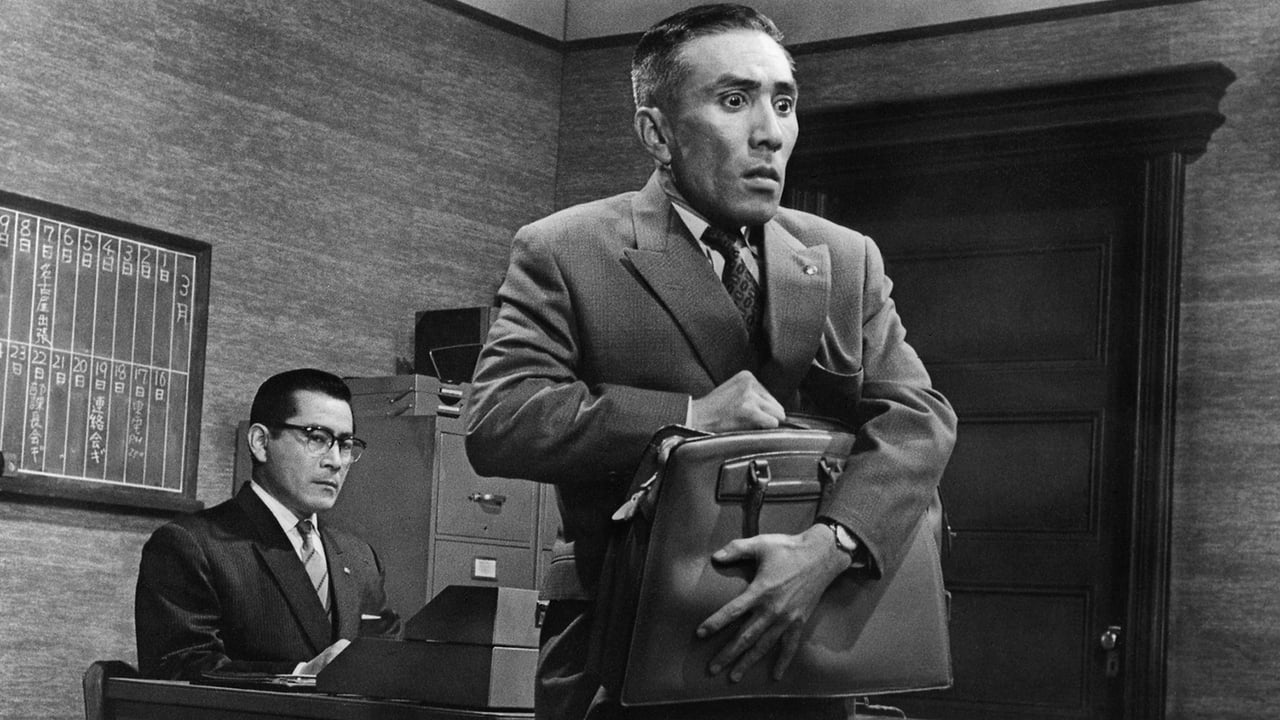

Takes itself way too seriously
... View MoreIt's a mild crowd pleaser for people who are exhausted by blockbusters.
... View MoreOne of those movie experiences that is so good it makes you realize you've been grading everything else on a curve.
... View MoreWhile it doesn't offer any answers, it both thrills and makes you think.
... View MoreAkira Kurosawa's lambasting of Japan's post-war corporate culture, The Bad Sleep Well, is one of many collaborations with actors Toshiro Mifune and Takashi Shimura and one of several of his film's rooted in the work of William Shakespeare. It's been somewhat unfairly overshadowed by the brilliance of those other films, but given the near-perfection of those movies, many of which regularly make those awful, generic 'top 100 movies' lists created by various magazines and websites, it's hardly surprising. But The Bad Sleep Well is one of Kurosawa's most ingeniously paced, clinically filmed and potently pessimistic movies.Beginning with one of the most exceptional opening sequences in cinema, a crowd of journalists gather at the wedding reception of Nishi (Mifune) and Yoshiko (Kyoko Kagawa) attended by a host of corporate high-flyers. Yoshiko is the daughter of Corporation Vice President Iwabuchi (Masyuki Mori), whose company is facing scrutiny over suspected bid rigging and corruption. The press have gathered to witness the awkward toasts given by the various sweaty workers, delivered on a podium reminiscent of a witness stand. As the speeches are given, the wedding cake is wheeled in and revealed to be in the form of the corporate office building, with a single red rose protruding from the window in which Assistant Chief Furaya committed suicide from years earlier.As a couple of higher-ups are arrested, Nishi steps in to reveal his plan of revenge. He has donned the disguise of a eager hopeful looking to marry himself up the corporate ladder, but is actually Furaya's son and has uncovered the trail of greed and corruption that led to his forced suicide. And all roads lead to Iwabuchi. Loosely based on Hamlet, The Bad Sleep Well is less faithful to the source material than Kurosawa's other Shakespeare adaptations. Working for the first time with his own production company, Kurosawa instead took the chance to voice his disgust at Japan's post-war capitalist takeover, where underlings are expected to take their own lives to save their boss's skin and back-hand dealings are less suspected than expected.The title suggest something noir-ish, a genre Kurosawa is not unfamiliar with. But this has only brief shades of noir, and the title only serves as a warning of the grim pessimism smeared on thick throughout. At over two hours, the film is perhaps too long, becoming muddled at the points in which it should be tight and thrilling. But this is certainly a display of the director's formidable talent. The aforementioned opening wedding section is an expert mixture of comedy, tense drama and mystery, and was almost certainly paid homage to in The Godfather (1972). Mifune too, delivers a powerhouse performance as Nishi, stepping out of the shadows to become the beast he seeks to destroy. The climax may be too overtly bleak for some, but for the most part this is beautifully filmed, riveting stuff.www.the-wrath-of-blog.blogspot.com
... View MoreIngeniously incorporating some Hamlet into the core of the film, the first Kurosawa made in the sixties returns to the urban surroundings he had not only done so expertly previously but would film with verve especially in "Tengoku to jigoku" ('High and Low', 1963), perhaps my favourite Kurosawa.While his previous film, "Kumonosu-jô" (1958), was a period piece, "The Bad Sleep Well" incorporates the Shakespearen elements revenge, familial honor and defilement into a modern, contemporary setting. As much as I love his samurai epics, I've found his films set in contemporary Japan to be invigorating and hectic, bursting with the same creative energy and gusto as Imamura's explorations of the lower tiers of Japanese society. Some of this, I suppose, is an unconscious attempt to break away from the stereotypical perception of Kurosawa, who is, in the mainstream, seen as the "director of samurai epics". But these are great films, mind!And so is this — and it has one of the most provocative, sublime and exhilarating opening scenes ever. What makes it even more fun is how he plays with "Hamlet", it's deliciously foggy as to who on earth Mifune is playing, since he's the one getting married! But that's a by-product, the most amazing thing in the way it all unfurls: we enter a wedding ceremony with a group of journalists, and watch them watch the action unfold, and watch them making conclusions for us, commenting on the action that takes place in the banquet. They obviously know something's not right, and we learn it quickly, too. And doesn't the name of the film, "The Bad Sleep Well", also tell us that everything is not as it seems?And Kurosawa makes it all look so easy: cutting between the reception area and the ceremony, sometimes moving the camera from one impeccable mise en scène to reveal another. The whole film is like this, fireworks, utter entertainment visually that's not mere eye candy but serious art that's so effortless it's impossible to figure out how he was able to conceive gems like this. And considering he did it year in, year out, is remarkable.Of course, the whole film is a revelation of interwoven scenes of highest mastery. It's 150 minutes of a tight pace and atmosphere, plotting, even retaliation and bits of comedy. And these urban films have something else going for them: they show the subtler Mifune, an actor capable of more than the extravagant animalism.A wonderful film from a wonderful filmmaker, nay, a master filmmaker.
... View MoreI enjoyed Akira Kurosawa's medieval adaptations of Shakespeare (Ran, Throne of Blood), as well as his contemporary thriller, High and Low, but I have to say this contemporary thriller adaptation of Hamlet is the weakest of the bunch.Not to say it's bad - it was still a great watch, just that it was way too long at 151 minutes. It's pretty amazing how Kurosawa made such a contemporary movie back in 1960 that it still feels fresh today. His direction is mostly tight and suspenseful and the movie is further augmented by an effective score and good acting all around, especially by Kurosawa stalwart, Toshiro Mifune.But overly long it is, and less interesting scenes had my attention wandering. Maybe I should blame Shakespeare instead. Gawd knows I already find him long-winded and boring.
... View MoreOne of the world's great directors (Akira Kurosawa ) paired again with one of the world's great actors (Toshiro Mifune) in a noir attack on corporate corruption. Kurosawa is a consummate storyteller, with a genuinely all-seeing eye. I don't know enough about film theory to tell you exactly why it is his films work or are great; I can only compare them to my other experiences watching a wide variety of films, and his are entertaining, morally complex, living things, that fed from, and into, western cinema, bringing a something very Japanese in terms of both storytelling and acting style. He seems to elicit emotional responses, without seeming to try. All the best acrobatic feats have this effect, and this, I think, is one reason why Kurosawa is a great director. Mifune has an intensely charismatic presence: you feel he really gives of himself in every performance. Actors today who remind me of him are Tony Leung ("In the Mood for Love") and Christian Bale. This probably isn't his best showcase, though: check out "The Seven Samurai" and "Yojimbo", among his best.In "The Bad Sleep Well", Nishi seeks revenge for his father's 'suicide'. Hiding behind thick horn-rimmed glasses and a formal, reserved image, he mercilessly hunts down the 'Corporation' leaders responsible, and no target is too great, or price too high, to pay. Apparently this takes the 'Hamlet' model for its story, but I don't really care about that. Any story, however old and continually retold, can be invigorated by an entirely new, and skillful perspective.The wedding scene is absolutely extraordinary; the way the tension is slowly ramped up, the vague (and not so vague) feelings of unease, the differing perspectives on it, the silence. In such a charged atmosphere, the smallest detail the bride, who limps and has to wear a specially raised shoe, stumbles, and the groom is notably not the first to rush to assist her takes on significance and high drama. The journalists who crowd the edges of the scene act like a Greek chorus, with their sardonic comments about the proceedings.The other amazing scene, showing skillful use of sound, is when Nishi forces a worker who was ordered to commit suicide to watch his own funeral, and to listen to a recording of his callous bosses in a nightclub. The louche bossa nova plays swooningly out over scenes of the man's wife and daughter at the ceremony, seen through a car window, bowing repeatedly as a succession of mourners pay tribute. The chanting of the monks can be heard in the background, and at the moment when his bosses are before him, bowing to his family, their heartless voices can be heard on the nightclub recording. The man's desperation at the climax of this scene is very moving. It's masterfully done. All Kurosawa's films, but particularly "High and Low", exhibit his extraordinary use of sound, music and dialogue. The savage, dismal end of the film and the bomb-devastated surroundings seem to reflect strongly the sense of moral dismay, of waste and shame and corruption.Don't get caught up or put off - by the whole 'great director' thing; likewise, don't let the subtitles or that it's black and white make you glassy-eyed. If you can strip your mind of the need for modern day filmic tics, you'll find this an engrossing and intelligent drama.
... View More